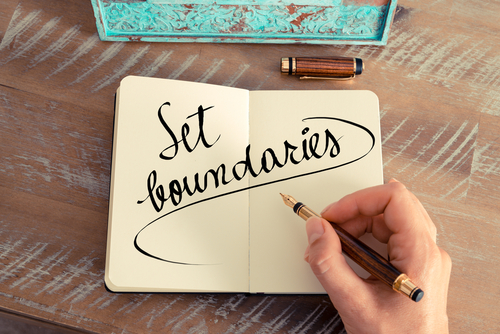Picture yourself building a fence around your home and ask yourself: “Why am I doing this?” The answer is obvious. In the real world, fences serve to keep unwanted visitors out, thereby protecting you and your property.
Now, we can easily translate the above metaphor into the realm of relationships. Just as an actual fence serves to safeguard your real estate, boundaries exist to protect your “inner estate” – i.e. your physical, mental, and emotional well-being.
However, similar to their physical counterparts, boundaries can either be strong and stable, offering lasting and reliable protection or poorly built, providing virtually no defense against intrusion. This makes it imperative to learn how to set healthy boundaries in a relationship, as well as how to recognize unhealthy ones in order to take the necessary steps to overcome them.
What Are Healthy Boundaries?
Healthy boundaries are physical, intellectual, and emotional limits we set for our interactions and relationships, with the purpose of protecting our physical health, as well as mental and emotional well-being.
Within a relationship, these boundaries enable us to:
- Maintain our individuality and independence;
- Clearly communicate our needs, ensuring they’re met;
- Know when to say “yes” and when to say “no” (and accept when others do it);
- Draw our sense of self-worth from within, rather than relying on others for validation.
The beauty of establishing healthy boundaries is that they’re an immense contributor to personal growth, as well as the evolution of a relationship. Not only do they allow us to express ourselves without fear of judgment and rejection, they help us learn to honor and respect the needs of our partners.
As it’s evident, healthy boundaries are not about building walls. Rather, they’re all about cultivating a fertile ground, a safe space where everyone involved can grow freely, both as individuals and partners.
What Are Unhealthy Boundaries?
Unhealthy boundaries typically emerge when the aforementioned limits are poorly defined and/or understood or when they become blurred to the point of non-existence. Needless to say, these boundaries present a detriment to every aspect of a person’s well-being, including:
- The formation of codependent behavior, where one person sacrifices their own values, wants, and needs, becoming fully reliant on others for validation and sense of self-worth;
- Disrespect/disregard of the values, beliefs, and opinions of others, unless they coincide with their own;
- Overcompliance (not saying “no”) or forceful assertion (not accepting when others say “no”), which can lead to a host of abusive or borderline abusive scenarios.
As it stands, unhealthy boundaries are the polar opposite of their healthy counterparts. They don’t allow for personal growth, self-affirmation, independence, and, in the most extreme cases, fulfillment of the most basic human needs.

How Do You Identify Unhealthy Boundaries?
Spotting poor boundaries, whether yours or your partner’s, requires both a keen eye and profound self-awareness, making this undertaking challenging. To make it easier to understand, here are some opposing examples of boundaries in a relationship:
- Example 1: After an exhausting day at work, Sarah kindly asks their partner Mark for some alone time to unwind, before they invite neighbors over to watch football.
- Healthy response: Mark turns off the TV, giving Sarah much-needed peace and quiet to recuperate and recharge her batteries;
- Unhealthy response: Mark immediately invites neighbors over and they crank up the volume on the TV, making it impossible for Sarah to rest.
- Example 2: Jake wants to take their partner Alan for a romantic dinner, yet they both have incredibly busy schedules.
- Healthy response: Jake talks to Alan about their intentions and they both find the time and date to make the romantic night happen;
- Unhealthy response: Jake goes ahead without Alan’s knowledge and reserves the spot in a fancy restaurant, then gets angry when Alan says they won’t be able to make it.
- Example 3: Lily and their partner Emily set up a movie night. However, two days before movie night, Lily receives an invitation from an old friend, whom they haven’t seen in ages, asking to meet for some long-overdue catching-up. Lily promptly converses with Emily, asking if it’s OK with postponing the date.
- Healthy response: Emily would rather Lily spend some time with her, and she acknowledges that he may not see his friend again for a long time. They tell him this, yet still insists that they go to a reunion;
- Unhealthy response: Emily guilt-trips Lily into staying, knowing full well that the opportunity for a reunion won’t present itself again anytime soon.
From the previous examples, we can easily extrapolate how unhealthy boundaries:
- Foster resentment and discomfort;
- Cause one person to overextend themselves;
- Exercise blatant disregard for the feelings, needs, and wants of others.
How Do You Overcome Poor Boundaries?
Setting healthy boundaries in a relationship or transforming bad into good ones is a gradual process. It involves intensive self-reflection and conscious effort to clearly define your needs, desires, and aspirations, followed by asserting them in a respectful and considerate manner.
Fortunately, setting boundaries is also a skill that can be learned and honed! You can go about it DIY-style, by employing self-help techniques such as journaling, or by asking for advice from loved ones outside of the relationship.
However, if you’ve tried other methods and you’re still struggling with setting or maintaining meaningful limitations, consider seeking professional help. Coaching, therapy, or counseling can all guide you through boundary-setting and emotional regulation, more effectively than any other technique.

Learn How To Set Boundaries In A Relationship With PIVOT’s Help
It is time to put yourself first, without fear, guilt, or hesitation! PIVOT is offering you the opportunity to master the art of setting healthy boundaries, empowering you to build relationships that align with your values and aspirations.
At our idyllic Glass House retreat, you will set out on a revitalizing journey of self-discovery and personal growth. Guided by our experienced coaches in personalized sessions, you will acquire practical tools and techniques necessary to establish and maintain healthy boundaries in various aspects of your life.
Reach out to us today and unlock your immense potential to form genuine connections and fulfilling relationships!

